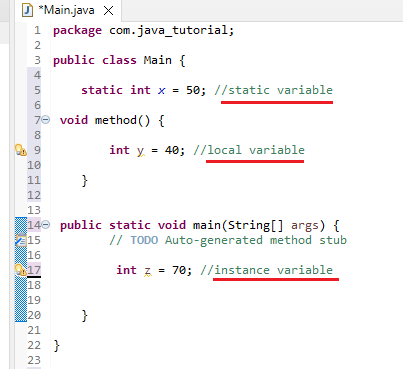Types of Variables in Java:
| We can use the Eclipse IDE for this example. If you do not know about it then follow this link- How to Install Eclipse For Java and create a program in it. |
Variables are locations in memory in which values can be stored. Each one has a name, a type and a value. Before we can use a variable, we have to declare it. After it is declared, we can then assign values to it.
Java actually has three kinds of variables.
(1) Instance variables are used to define the attributes of a particular object. It is called an instance variable because its value is instance-specific and is not shared among instances.
(2) In Java, static variables are also called class variables. Class variables are similar to instance variables, except their values apply to all that class’s instances (and to the class itself) rather than having different values for each object. Memory allocation for static variables happens only once when the class is loaded in the memory.
(2) local variables are declared within the body of a method or within a block of code contained within the body of a method. Local variables are slightly different; the compiler never assigns a default value to an uninitialized local variable. If you cannot initialize your local variable where is is declared, make sure to assign a value to it before you attempt to use it. Accessing an uninitialized local variable will result in a compile-time error.
Java does not have global variables-that is, variables that are global to all parts of a program. Instance and class variables can be used to communicate global information between and among objects.
Example- Types of Variables in Java:










Comments (No)